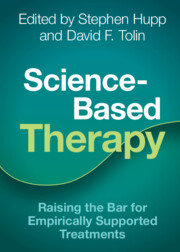Book contents
- Science-Based Therapy
- Series page
- Science-Based Therapy
- Copyright page
- Dedication
- Contents
- Tables
- Contributors
- Preface
- Acknowledgments
- 1 What Is Science-Based Therapy?
- 2 Depressive Disorders
- 3 Bipolar Disorder
- 4 Anxiety Disorders
- 5 Obsessive-Compulsive Disorder
- 6 Posttraumatic Stress Disorder
- 7 Dissociative Disorders
- 8 Pain
- 9 Eating Disorders
- 10 Insomnia Disorder
- 11 Sexual Dysfunctions
- 12 Substance Use Disorders
- 13 Cognitive Loss
- 14 Antisocial Behavior
- 15 Borderline Personality and Other Personality Disorders
- 16 Psychosis and Schizophrenia
- 17 Autism Spectrum and Intellectual Developmental Disorder
- 18 Attention-Deficit/Hyperactivity Disorder
- 19 Tic Disorders
- 20 Couples Discord
- 21 Psychotherapy Relationships
- Postscript
- Index
- References
11 - Sexual Dysfunctions
Published online by Cambridge University Press: 10 January 2025
- Science-Based Therapy
- Series page
- Science-Based Therapy
- Copyright page
- Dedication
- Contents
- Tables
- Contributors
- Preface
- Acknowledgments
- 1 What Is Science-Based Therapy?
- 2 Depressive Disorders
- 3 Bipolar Disorder
- 4 Anxiety Disorders
- 5 Obsessive-Compulsive Disorder
- 6 Posttraumatic Stress Disorder
- 7 Dissociative Disorders
- 8 Pain
- 9 Eating Disorders
- 10 Insomnia Disorder
- 11 Sexual Dysfunctions
- 12 Substance Use Disorders
- 13 Cognitive Loss
- 14 Antisocial Behavior
- 15 Borderline Personality and Other Personality Disorders
- 16 Psychosis and Schizophrenia
- 17 Autism Spectrum and Intellectual Developmental Disorder
- 18 Attention-Deficit/Hyperactivity Disorder
- 19 Tic Disorders
- 20 Couples Discord
- 21 Psychotherapy Relationships
- Postscript
- Index
- References
Summary
Sexual dysfunctions are diagnosed differently in women and men. Diagnoses for women include female sexual interest/arousal disorder, female orgasmic disorder, and genito-pelvic pain/penetration disorder. Diagnoses for men include hypoactive sexual desire disorder, erectile disorder, delayed ejaculation, and premature ejaculation. Research on treatments is limited. Common components of psychological treatments include psychoeducation, cognitive restructuring/emotional regulation, stimulus control/desensitization, contextual modifications, mindfulness, and relationship skill building. A sidebar describes comprehensive sex education for youth.
Keywords
- Type
- Chapter
- Information
- Science-Based TherapyRaising the Bar for Empirically Supported Treatments, pp. 175 - 192Publisher: Cambridge University PressPrint publication year: 2025
References
Useful Resources
Brotto, L. A., & Nagoski, E. (2018). Better sex through mindfulness: How women can cultivate desire. Greystone Books.
Goldstein, A., Pukall, C. F., & Goldstein, I. (2020). Female sexual pain disorders evaluation and management (2nd ed.). Wiley-Blackwell.
Hall, K. S. K., & Binik, Y. M. (2020). Principles and practice of sex therapy (6th ed.). Guilford Press.
McCarthy, B. W., & McCarthy, E. J. (2021). Contemporary male sexuality: Confronting myths and promoting change. Routledge.
Meana, M. (2012). Sexual dysfunction in women. Hogrefe Publishing.
Perel, E. (2007). Mating in captivity: Unlocking erotic intelligence). Harper.
Rowland, D. (2012). Sexual dysfunction in men. Hogrefe Publishing.

